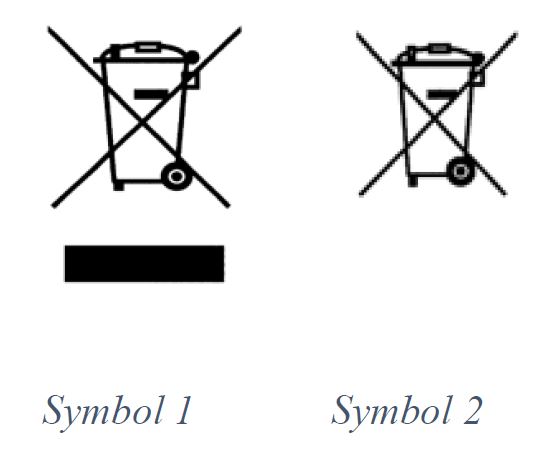COLLECTION OF OLD ELECTRONIC EQUIPMENT / BATTERIES
We believe in respectful behavior towards the environment, which is why we offer you options to hand in your old electrical equipment/batteries easily and free of charge.
The consumer has a very fundamental role in the system of dealing with electrical appliances and batteries. He is the one who decides what to do with the old appliance/battery. Old and unnecessary electrical equipment and batteries do not belong in unsorted municipal waste, on the contrary, they should be handed over through collection points, so-called take-back points, from which they go to reuse or to recycling itself.
The consumer must be informed by the symbols below that the relevant electrical equipment/battery does not belong in municipal waste. All new electrical equipment/batteries are thus marked. The symbol can be shown directly on the device, on its packaging or in the user manual or in the warranty card.

How to get rid of old appliance/batteries?
- natural persons can use the service: BE LAZY
- legal entities can use: Collection for registered partners
- through the publicly available collection network of REMA Systém, a.s., which is intended for return of electrical equipment
- through the publicly available collection network of REMA Battery, s.r.o., which is intended for take-back of batteries and accumulators
- through the publicly available collection network, which is intended for take-back on the Ministry of Life environment (ISOH 2)
- if necessary, it is possible to consult on the free line Chytré recyklace (800 976 679)
Why recycle?
Not only electrical equipment, but also batteries and accumulators contain many recyclable metals such as zinc, iron, manganese, nickel, cadmium or lead. At the same time, some of these substances are very dangerous for the environment and human health, especially mercury, lead and cadmium. Selected batteries are often marked with the symbol of the chemical element they contain (Pb, Cd, Hg).
By handing over batteries and electrical equipment to the take-back site, we save primary sources of raw materials, especially thanks to material recycling, and at the same time protect our environment from possible improper handling.
Unused batteries that are not handed over for recycling through take-back points, but are stored, for example, in office drawers or anywhere else in homes or businesses can subsequently cause a fire. Lithium batteries in particular have this property. Therefore, for safety reasons, it is very important to hand over used batteries for recycling as soon as possible.
The most common types of batteries, their designation and use:
|
Battery type |
Common Designation |
Size |
Examples of use |
|
Alkaline |
Alkaline, Alkaline, |
AAA, AA, |
Flashlights, calculators, toys, watches, |
|
AlMn |
C, D, 6V, |
smoke alarms, remote controls |
|
|
9V |
|||
|
Buttons |
Alkaline, lithium, |
Size se |
Watches, hearing aids, toys, |
|
mercury, silver, |
various |
congratulations, remotes |
|
|
zinc air |
|||
|
Zinc carbon |
Classic, Heavy Duty, |
AAA, AA, |
Flashlights, calculators, toys, watches, |
|
Power Cell |
C, D, 6V, |
smoke alarms, remote controls, |
|
|
9V |
portable radios, gate openers |
||
|
Lithiums |
Lithium, Lithium Ion, |
Size se |
Laptops, mobile phones, digital |
|
Li-Ion |
various |
cameras, mp3 players |
|
|
Nickel-cadmium |
Ni-Cd |
Size se |
Cameras, hand tools, wireless |
|
various |
telephones, radios |
||
|
Nickel metal hydrides |
NiMH, Ni-Hydride |
Size se |
Cameras, hand tools, wireless |
|
various |
telephones, radios |
||
|
Leaded |
SLA, gel |
2V, 6V, |
UPS, wheelchairs, off-road vehicles, |
|
12V |
jet skis |
||
|
Mercury |
Mercury, Hg, HgO |
Size se |
Watches, hearing aids, toys, |
|
various |
congratulations, remotes |
||
|
Silver |
Silver, AgO |
Size se |
Watches, hearing aids, toys, |
|
various |
congratulations, remote controls |
Current information regarding the take-back of end-of-life electrical equipment can be found at this link:
Zpětný odběr vysloužilých elektrozařízení / baterií
